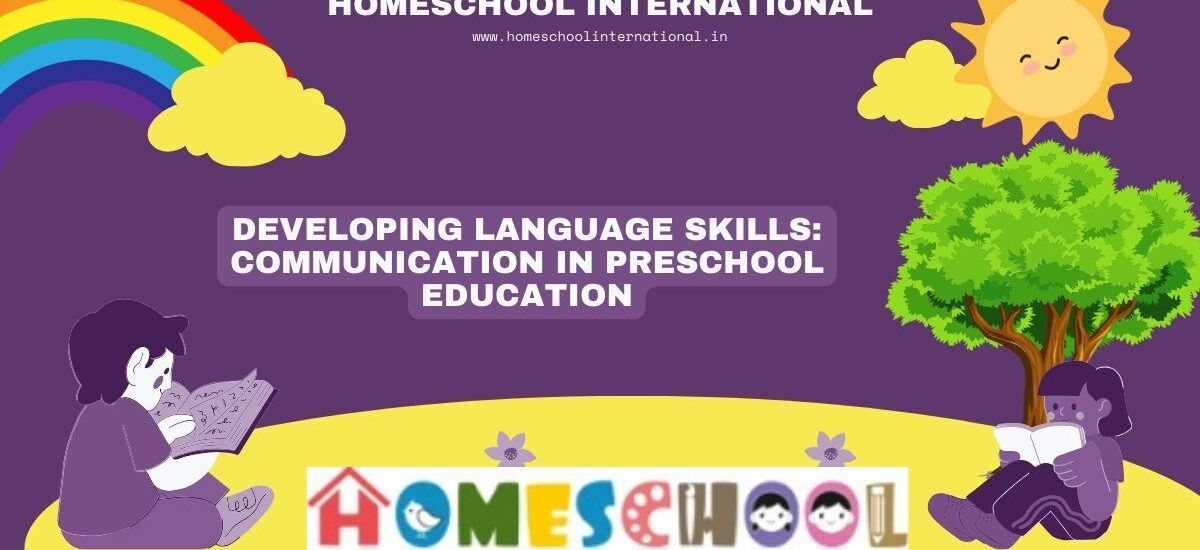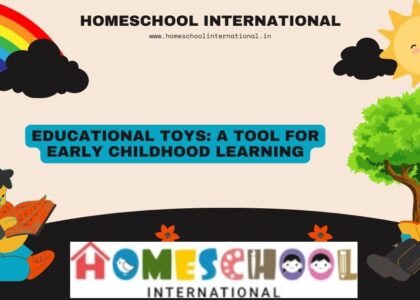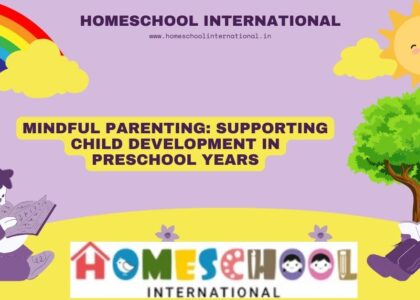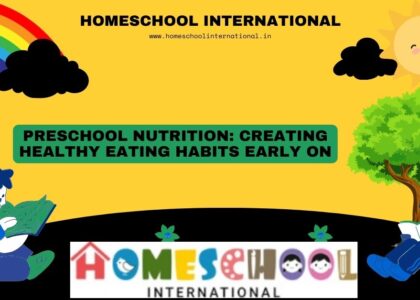Developing Language Skills: Communication in Preschool Education- Communication lays the foundation for learning, socialization, and connection in preschool education. In the intricate web of early childhood development, “Communication in Preschool Education” emerges as a vital cornerstone. Welcome to our exploration of how developing language skills fosters growth and enrichment in preschool settings. At Homeschool International, we recognize the profound impact of effective communication on children’s cognitive, social, and emotional development. Join us as we delve into the importance of nurturing language skills and fostering meaningful communication experiences in preschool-aged children.
Understanding Language Development in Preschoolers
- Foundations of Language Acquisition:
- Discuss the foundational stages of language development in preschool-aged children, including phonological awareness, vocabulary acquisition, and grammatical comprehension.
- Highlight the rapid growth and plasticity of the brain during this critical period, which lays the groundwork for future language skills.
- Importance of Early Language Exposure:
- Emphasize the significance of early language exposure and rich linguistic environments in shaping children’s language development.
- Discuss how interactions with caregivers, peers, and educators provide opportunities for language learning and expression.
- Role of Communication in Learning:
- Explore the integral role of communication in facilitating learning, problem-solving, and social interaction in preschool settings.
- Highlight the reciprocal relationship between language development and cognitive development, wherein language skills support various aspects of cognitive growth.
- Understanding Individual Differences:
- Recognize the diverse range of language abilities and learning styles among preschoolers.
- Discuss the importance of accommodating individual differences and providing tailored support to meet each child’s unique communication needs.
By structuring the content with clear headings and incorporating relevant keywords, this section not only enhances readability but also improves search engine visibility for the topic of understanding language development in preschoolers.
Strategies for Fostering Communication Skills
- Creating Language-Rich Environments:
- Discuss the importance of creating language-rich environments in preschool settings, including opportunities for meaningful conversations, storytelling, and language play.
- Highlight the role of visual aids, books, and interactive materials in stimulating language development and fostering vocabulary growth.
- Encouraging Active Listening and Verbal Expression:
- Advocate for promoting active listening skills and verbal expression among preschoolers through engaging activities, such as circle time discussions, show-and-tell sessions, and dramatic play.
- Discuss the importance of providing opportunities for children to express themselves verbally and share their thoughts, feelings, and ideas with others.
- Integrating Language into Daily Activities:
- Explore ways to integrate language development into daily activities and routines, such as mealtime conversations, outdoor exploration, and arts and crafts projects.
- Discuss how embedding language learning opportunities into everyday experiences enhances children’s language skills and fosters natural language acquisition.
- Modeling Effective Communication:
- Stress the importance of modeling effective communication behaviors for preschoolers, including clear and concise speech, active listening, and respectful dialogue.
- Discuss how educators and caregivers serve as role models for language use and provide scaffolding and support for children’s language development.
By structuring the content with clear headings and incorporating relevant keywords, this section not only enhances readability but also improves search engine visibility for the topic of fostering communication skills in preschool education.
Promoting Social Interaction and Collaboration
- Encouraging Peer Communication:
- Discuss the importance of peer interaction in preschool settings for language development.
- Highlight activities such as group discussions, collaborative projects, and cooperative play that foster communication skills among peers.
- Facilitating Turn-Taking and Sharing:
- Explore strategies for teaching preschoolers the importance of turn-taking and sharing during communication.
- Discuss how structured activities and games can provide opportunities for children to practice these skills in a supportive environment.
- Promoting Empathy and Understanding:
- Emphasize the role of communication in promoting empathy and understanding among preschoolers.
- Discuss activities that encourage children to listen actively, show empathy towards others, and communicate their feelings and perspectives effectively.
- Celebrating Diversity and Inclusion:
- Advocate for creating inclusive environments that celebrate diversity and promote respect for different languages, cultures, and perspectives.
- Discuss how exposure to diverse language and cultural experiences enriches children’s understanding of the world and enhances their communication skills.
By structuring the content with clear headings and incorporating relevant keywords, this section not only enhances readability but also improves search engine visibility for the topic of promoting social interaction and collaboration in preschool education.
Utilizing Technology as a Communication Tool
- Introduction to Technology in Preschool Education:
- Discuss the role of technology as a communication tool in modern preschool education.
- Highlight the potential benefits of technology in enhancing communication skills, such as facilitating virtual interactions, providing access to educational apps and games, and promoting digital literacy.
- Interactive Learning Platforms:
- Explore interactive learning platforms designed specifically for preschoolers, such as educational websites, mobile apps, and interactive whiteboards.
- Discuss how these platforms can engage children in language-rich activities, such as storytelling, vocabulary games, and virtual field trips.
- Virtual Communication Tools:
- Discuss the use of virtual communication tools, such as video conferencing platforms and messaging apps, to facilitate communication between preschoolers, educators, and parents.
- Highlight the benefits of virtual communication for fostering collaboration, sharing ideas, and maintaining connections in remote learning environments.
- Digital Storytelling and Multimedia Projects:
- Explore the use of digital storytelling and multimedia projects as tools for promoting language development and creativity.
- Discuss how children can use digital tools to create and share their own stories, presentations, and multimedia projects, enhancing their communication skills in the process.
By structuring the content with clear headings and incorporating relevant keywords, this section not only enhances readability but also improves search engine visibility for the topic of utilizing technology as a communication tool in preschool education.
Collaborating with Parents and Caregivers
- Importance of Parental Involvement:
- Highlight the critical role of parents and caregivers in supporting children’s communication development.
- Discuss the importance of fostering partnerships between educators and families to promote consistent language-rich environments at home and in preschool settings.
- Sharing Information and Resources:
- Advocate for open communication channels between preschools and parents to share information and resources related to language development.
- Discuss the value of providing parents with guidance, tips, and activities to support language learning at home.
- Parent Education Workshops:
- Discuss the benefits of hosting parent education workshops focused on communication strategies and language development milestones.
- Highlight topics such as the importance of reading aloud, fostering conversational skills, and supporting bilingualism in preschool-aged children.
- Encouraging Home-School Connections:
- Explore ways to encourage home-school connections that reinforce communication skills learned in preschool.
- Discuss the benefits of involving parents in classroom activities, inviting them to participate in storytelling sessions, language-themed events, and cultural celebrations.
By structuring the content with clear headings and incorporating relevant keywords, this section not only enhances readability but also improves search engine visibility for the topic of collaborating with parents and caregivers to support communication in preschool education.
Conclusion: Developing Language Skills- Communication in Preschool Education
- Reflecting on Communication Milestones:
- Reflect on the journey of exploring communication in preschool education and the milestones achieved along the way.
- Acknowledge the importance of effective communication skills in fostering children’s growth, development, and success.
- Embracing a Collaborative Approach:
- Emphasize the value of collaboration between educators, caregivers, and parents in promoting communication skills in preschool-aged children.
- Highlight the collective effort required to create language-rich environments and support children’s language development journey.
- Continued Commitment to Communication:
- Express a commitment to continued support for communication initiatives in preschool education.
- Encourage ongoing collaboration, professional development, and research to enhance communication practices and outcomes for all children.
- Gratitude and Encouragement:
- Extend gratitude to readers for their interest in communication in preschool education and their dedication to supporting children’s language development.
- Encourage readers to apply the insights gained from this blog post in their interactions with preschool-aged children, fostering a culture of effective communication and language enrichment.











